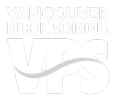She’s a champion for all students, a proponent of critical thinking and a fierce advocate for diversity. Bethany Rivard, the 2016 Teacher of the Year for the Educational Service District 112 region, has been a beloved educator at Fort Vancouver High School for nearly a decade. Here, she discusses the changes she’s seen at Fort, her students and what she’d be doing if she weren’t in the classroom.
Inside VPS: You’ve been teaching at Fort for the past nine years. What kind of changes have you seen?
Rivard: When I first started working at Fort, we had a public image problem. There was a highly publicized fight in the cafeteria in 2007 that garnered a lot of local press and colored how people thought of Fort Vancouver High School. Positive changes really started to occur when a group of students held a peace rally in response to the fight and refused to allow one negative event to define Fort. During that time, Jeff Snell (our principal at the time) really focused on climate and culture. Ever since then, we have intentionally made positive culture a priority at Fort.
Has the transition to the Center for International Studies affected what or how you teach?
Five years ago, Sherri Priestman, Julia Morrison, Jon Selby and I created a senior English course called Contemporary Cultures in Literature. This course was set up with a global focus and the literature was meant to be viewed through an international anthropological lens. So, in some ways I’ve been focused on global lit for a few years. What International Studies has done for me is put a focus on experiential learning. I’ve made it a priority to do more project-based learning and also to get my students out of the classroom. Last week I was able to take all my Advanced Placement students to a play at Portland Center Stage to see a performance that connected to a unit we were studying about the Holocaust. I look forward to continuing to look for opportunities that take learning out of the classroom.
You’ve spoken about how proud you are of your students, particularly those who have overcome great obstacles. What do you believe is the biggest across-the-board challenge facing your students?
The biggest obstacle is poverty. Our students have to contend with the challenges of often having to work to help with the bills and to take care of their siblings while their parents are at work. There are so many issues that come up around students and poverty that affect their learning; that is the single greatest across-the-board challenge.
How have you seen your students overcome those challenges?
Programs like Advancement Via Individual Determination, or AVID, are effective at addressing those challenges. When I taught AVID, my students were able to learn study skills and get help with college applications. They learned how to do group tutorials and how to access financial help for higher education. College in the High School through Central Washington University is another great program. Students are able to get college credit while in high school classes, earning credit for English 101 and English 105. We are grateful that Vancouver Public Schools has paid for a semester’s worth of credits for our students. Because they earn credit, they are more likely to enroll in college. They want to build upon their success!
You’ve advocated for many students, including helping seniors gain early admission to college and working with the MEChA club. Why is this a passion for you?
There is lots of talk in the educational world about closing the “opportunity gap.” For me, advocating for students and pursuing avenues to help them succeed is a way I can help. MEChA and other student leadership groups are so powerful, because if students can advocate for themselves in public and continue to be a voice of leadership beyond high school, that’s when opportunities and change really take place in society at large.
What has been your proudest moment as a teacher?
Hands down my proudest moments are when I see students find their own voice. When they begin to speak their own truth, there is nothing more powerful.
What would you be doing if you weren’t teaching?
I almost went into law… That would have been a huge mistake.
This and other stories originally appeared in the June 2016 issue of Inside Vancouver Public Schools.
(Photo by Katharine Kimball Photography.)
